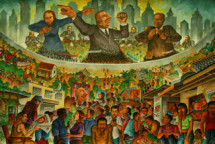Ideas into movement
Boost TNI's work
50 years. Hundreds of social struggles. Countless ideas turned into movement.
Support us as we celebrate our 50th anniversary in 2024.

How does the rise of Islamic populism in Indonesia signal a return of fascist ideologies and practices that use nationalism and religion as political instruments to clear a new pathway for capital accumulation?

Historically, nationalism and religion have always been the subject of controversial debates in Indonesia’s rhetoric of identity since colonial time. Under the military’s influence, Indonesian nationalism and values have been defined, interpreted and developed into the ideology of family state, which legitimised the authoritarianism of Soeharto’s “New Order” regime (1966 - 1998). The control of military power has become pervasive, especially after the 1965-66 massacres and persecution of leftists. The rural peasants were depoliticised through one-party domination, and incorporated fully into the market through Green Revolution. The land reform law of 1960 was labeled as leftist’s agenda, and all peasant struggles were suspected as communist acts.
The New Order regime’s violence and persecution successfully constructed a culture of fear, politically demobilized peasants, and eliminated constraints for capital accumulation. State oligarchs, Chinese business conglomerates and military personnel controlled the logging, mining, plantation and financial companies throughout the New Order period. Such economic domination has marginalized Islamic politics and narrowed market chances for Moslem groups to become part of the Indonesian bourgeoisie. In recent years, with the wave of ‘conservative turn’ of Islam and inequality rising, anti-Chinese, and anti-communist sentiments were used by the military to build imaginary threats, “proxy war” doctrines and paranoid moral panic. Riding the same wave, Moslem middle class entrepreneurs launched a campaign of ‘economic jihad’, and formed a ‘212 Moslem-cooperative’. We argue that Islamic populism is mainly a vehicle for fascist ideology to gain tracts to power, while the rural and urban poor remain as ‘floating mass’, and entrapped in many so - called ‘empowerment’ projects. The suppression of class ideology has located rural emancipatory politics in Indonesia in a dilemmatic position, as it is step - by - step incorporated into the populists’ agenda of accumulation.This combination of forces - right - wing militarism, conservative Islamic populism and the prevailing “dull compulsion of the market” – has become a powerful instrument for the co-optation and/or destruction of genuine emancipatory rural initiatives, as can be seen in the three local-level studies which my colleagues have prepared for the ERPI conference (Rahman 2018, Larastiti 2018, Wijaya 2018)
This paper was presented at the Emancipatory Rural Politics Initiative (ERPI) 2018 Conference: "Authoritarian Populism and the Rural World"